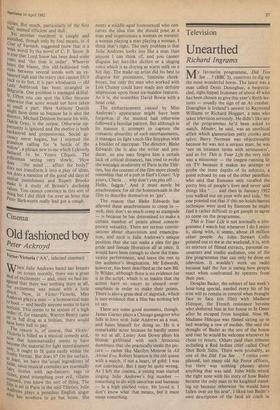Cinem a
Old fashioned boy
Peter Ackroyd
on screen recently, there was a great deal of excitement — and, since we had im- agined that there was nothing there at all, the excitement was mixed with a little shock. Now, in Victor/Victoria, Miss Andrews plays a man — a homosexual man to boot — and hardly anyone seems to have noticed. This seems to be sexism of a high order: if, for example, Warren Beatty came c),,n in full drag as a lesbian, there would have been hell to pay. , The reason is, of course, that Victor/ Victoria is billed as a musical comedy and, 20v, that homosexuality seems to have become the material for light entertainment only, it ought to fit quite easily within the frothy format. But does it? On the surface, at least, we have the'usual ingredients of fable, since musical comedies are essentially f al rY stories with tap-dancers: rags to riches,good triumphing over evil, villains exposed, you know the sort of thing. The film is set in Paris in the mid-Thirties; Julie Andrews plays a penniless English singer who has nowhere to go but home. She meets a middle-aged homosexual who con- ceives the idea that she should pose as a man and impersonate a woman en travesti: a woman playing a man playing a woman. I think that's right. The only problem is that Julie Andrews looks less like a man than anyone I can think of, and you cannot disguise her lute-like diction or a singing voice which is as cloying as warm milk on a hot day. The make-up artist did his best to disguise her prominent, feminine cheek- bones, but only the man who worked with Lon Chaney could have made any definite impression upon those ice-maiden features. As it is, she resembles David Bowie with a head cold.
The embarrassment caused by Miss Andrews's appearance might have been forgotten if the musical had otherwise followed a familiar pattern. But although in its manner it attempts to capture the romantic absurdity of such entertainments, it manages its light touch like Sisyphus with a boulder of marzipan. The director, Blake Edwards (he is also the writer and pro- ducer, so you may forgive him a certain lack of critical distance), has tried to evoke the nostalgic modernity of Paris in the Thir- ties, but the content of the film more closely resembles that of a pub in Earl's Court: 'Up yours, Cherie... why don't you piss off ... Hello, faggot.' And it must surely be anachronistic for all the homosexuals in the film to describe themselves as 'gay'.
The reason that Blake Edwards has allowed these anachronisms to creep in well, they don't so much creep as stampede — is because he has determined to make a certain number of points about contem- porary sexuality. There are serious conver- sations about chauvinism and emancipa- tion, and such is Julie Andrews's unique position that she can make a plea for gay pride and female liberation all at once. It would have been enough to show the trans- vestite performance, and leave the rest to the audience's imagination. Mr Edwards, however, has been described as the new Bil- ly Wilder, although there is no evidence for it in the script, which is so leaden that the actors have to resort to absurd over- emphasis in order to make their points. There is also a great deal of slapstick, which is sure evidence that a film has nothing left to say.
There are some good moments, though. James Garner plays a Chicago gangster who falls in love with Julie Andrews as a man, and hates himself for doing so. He is a remarkable actor because he hardly seems to act at all. Lesley Ann Down plays his blonde girlfriend with such ferocious dumbness that she practically steals the pic- ture — rather like Marilyn Monroe in All About Eve. Robert Stanton is the old queen with a watch, if not a heart, of gold: I was not convinced. But I may be quite wrong. As I left the cinema, a young man started singing Julie Andrews's big number something to do with senoritas and bananas — in a high pitched voice. He loved it. I don't know what that means, but it must mean something.


































 Previous page
Previous page